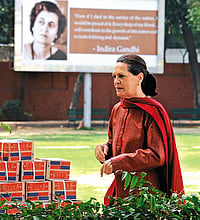The relationship between the RSS and its affiliates— specially the BJP—has always been tricky. Nagpur may be the Big Brother but has not always been able to shepherd younger siblings and has often had to step aside. The wider their public presence, the greater the problems of managing them. And the moral authority of the RSS top brass has diminished in recent years, as the old guard has given way to younger leaders who are yet to build the domineering presence of their predecessors.
In the past decade or so, the RSS has found it increasingly difficult to enforce its will on the BJP. Despite reported advice, L.K. Advani is yet to hang up his boots. The authority of the Nagpur-sponsored party president has remained weak. The BJP is increasingly looking like a collection of regional parties with strong chieftains and a bunch of aspiring ministers with little political base and no cognition of central authority.
The choices before the RSS are limited: either allow the drift to further erode its core agenda or take corrective action through tactical steps. It knows it can no longer monopolise authority but has to share power. It has also known that apparatchiks in khaki shorts have never been a great draw with voters.
And Narendra Modi might have begun his career with khaki but shed it the moment the RSS gave him a chance. The Modi-RSS conflict in recent years has mainly been psychological—about who gets to call the shots. Post-2002, Modi has paid scant regard to anyone else.
If the BJP’s national executive meet in Mumbai in May saw the RSS leadership grudgingly accept Modi’s clout, it was because—in the immediate context—they needed his support to secure a second term for Nitin Gadkari. The truce suggests that for the RSS Modi is an inevitable choice—at least in the future. He is the most credible face, capable of galvanising the cadre and make electoral dents outside traditional support bases. It suits Modi too—he needs a platform beyond Gujarat for his grandstanding.
In the long run, Modi’s success in the coming assembly polls is essential for the Sangh to stage a political comeback. Anything less than a resounding victory will not only hyphenate Modi’s career, it’ll also push back the parivar’s recovery chances by a few years. Besides, Modi also articulates the RSS worldview. He refuses tokenisms like accepting skullcaps from Muslims and remains unabashed about the events in 2002. Modi enacts policies where growth is pursued from a majoritarian perspective and the state prods sections to move on in order to live on. The man remains a diehard Hindutva votary. Barring his attitude towards his peers, the RSS has little to disagree.
The Sangh leadership also knows that not all disenchanted leaders will come on board. Modi too may not be keen on resurrecting past ghosts. But he’ll hope the truce with Nagpur brings back the cadre and allows him a broader stage. Which is not to say that in the event of Modi securing another electoral sweep, his anointment is guaranteed. The second innings of the Modi-Sangh relationship will evolve over the coming months—more so once the Gujarat verdict is out. Nagpur has not laid out the wares for Modi yet, but its bear hug is definitely visible.
Nilanjan Mukhopadhyay is the author of The Demolition: India at the Crossroads; E-mail your columnist: nilanjan.mukhopadhyay AT gmail.com

























